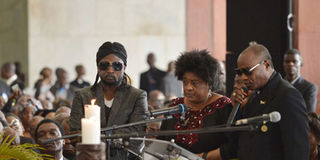Stars no longer welcome in Paris

Congolese singer Koffi Olomide (R) speaks next to Congolese singers Tshala Muana (C) and Werrason (L) during a ceremony in honour of late African superstar and king of Congolese rumba, Congolese singer-songwriter Tabu Ley Rochereau, at the People's Palace in Kinshasa on December 9, 2013. AFP/PHOTO
What you need to know:
- Several Congolese musicians have been greeted with catcalls and insults whenever they arrive in Paris for the shows. Every Congolese musician aspires to perform at the Zenith Hall as it signifies that a musician has ‘arrived.’
- From the 1980s, both men were members Wenge Musica before the big split that saw each walk away with a piece of the band — Maison Mere and BCBG. There would later be other offshoots like Wenge Aile Paris, Clan Wenge and Wenge Tonya Tonya of Adolphe Dominguez.
Political rivalry in Kinshasa has badly affected Congolese musicians as most of their top acts are no longer able to stage live performances in European cities.
Musicians seen as being close to the Kinshasa government have of late faced protests by opposition activists based in various European cities every time they try to perform.
Wenge Musica BCBG leader crooner J.B. Mpiana was the latest picketing victim. On December 21 last year, one of the most popular musicians in Kinshasa was due to perform at the legendary Zenith Hall in Paris.
The show, however, had to be cancelled as authorities feared that it would be violently disrupted.
Several Congolese musicians have been greeted with catcalls and insults whenever they arrive in Paris for the shows. Every Congolese musician aspires to perform at the Zenith Hall as it signifies that a musician has ‘arrived.’ The Olympia Hall in Paris also ranks among the prestigious venues for top musicians.
A FORMAL PROTEST
The protesting activists, popularly known as ‘combattants,’ are a left-wing diaspora group opposed to the Kinshasa regime of President Joseph Kabila. Any musician seen as being cosy with Kabila is no longer welcome in Europe.
Speaking to Saturday Nation recently, Kinshasa-based musician and produced Maika Munan, formerly of Tabu Ley’s Afrisa International, said their umbrella organisation, the Congolese Music Union, was not taking the matter lightly.
“We are planning a formal protest to the French authorities over the plight of our counterparts being barred from performing in Europe,” he said.
Another musician and producer, Lufombo Gode, said: “We hope the situation will improve to enable Kinshasa-based artistes to travel safely and perform in Europe like it was in the past.”
While Lingala music fans in Europe are currently denied a chance to attend concerts and enjoy some of the latest Congolese dance styles, the singers are denied access to the lucrative market in Europe, which has better recording studios than those in Kinshasa.
Paris-based Congolese veteran musician Nyboma Mwandido acknowledged the hostility towards the Kinshasa-based stars. “The cancellation of Mpiana’s show was just the latest confirmation that the show ‘ban’ by the combattants is still in force,” he said.
Claude Alain, the promoter of Mpiana’s cancelled show, was also subjected to threats and physical harassment by the activists.
Others who have been targeted in Europe, USA and Canada include Mpiana’s biggest rival Werra Son (Ngiama Makanda), the ‘queen of Mutuashi’ and politician Tshala Muana, and Koffi Olomide.
Others are sensational singers Fere Gola, and Fally Ipupa, the Nyoka Longo-led Zaiko Langa Langa Nkolo Mboka band and Felix Wazekwa.
Mpiana’s concert had been billed a reconciliation show. Both him and Werra Son are regarded as the kingpins of the fourth generation of Congolese musicians in the Wenge Music dynasty.
Before the big split
From the 1980s, both men were members Wenge Musica before the big split that saw each walk away with a piece of the band — Maison Mere and BCBG. There would later be other offshoots like Wenge Aile Paris, Clan Wenge and Wenge Tonya Tonya of Adolphe Dominguez.
It is still not clear how long the stand-off with the combattants in France, Belgium, South Africa and the UK will last. It is not only musicians who have been targeted. Politicians, too, have been humiliated.
In February 2012, Katanga Province governor Moise Katumbi Chapwe, who is also the TP Mazembe FC chairman, was assaulted by suspected members of the group while having lunch in a Brussels hotel.
Meanwhile in Kinshasa, all is not well for Koffi Olomide, the band leader of Quartier Latin International, who has been at loggerheads with seasoned music personality Zacharias Bababaswe. The two have been engaged in an endless war of words, blaming each other of sabotage.
Notably Koffi was in August 2012 charged in a Kinshasa court with assaulting his music producer over alleged non-payment of his album sales.
Like most of his counterparts, Koffi has now confined his live performances to Africa.





